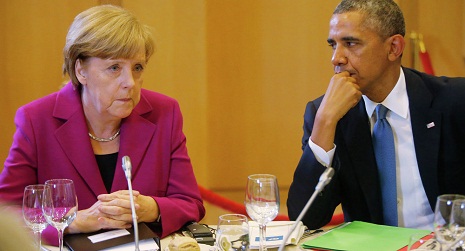Burning fossil fuels produces carbon dioxide, which traps the sun`s heat and warms the atmosphere.
The leaders agreed to press for a reduction by 2050 of 40 to 70 percent in the 2010 global emission levels of the greenhouse gases blamed for global warming. The range was a disappointment to some environmental activists, but the leaders added they recommended the "upper end" of that range. They also said they would commit to a "transformation of the energy sectors" in their countries to produce fewer carbon emissions.
The word "decarbonization" is used to mean the replacement of carbon-based fossil fuels by alternative sources such as wind and solar power. The term is open to interpretations that include the use of some fossil fuels.
A German government spokesman said that as used by Merkel the word meant "substantial" emission reductions in the next decades and "near zero" greenhouse gas emissions by the end of the century.
Merkel set climate change as a key topic for the gathering, just like she did the last time she hosted it in 2007.
Her goal was to come up with a united stance among the group`s advanced economies in order to better advocate for the goals at a much broader conference on how to combat global warming to be held Nov. 30-Dec. 11 in Paris. The thinking was that negotiations with other countries — including major greenhouse gas emitters such as China and India — would be easier if the developed world took a united position.
Ulf Moslener, professor of sustainable energy finance at the Frankfurt School of Finance & Management, said the G-7 statement was "largely a confirmation of what has already been agreed" on climate change. Its chief value was in getting the developed countries on the same page ahead of climate change negotiations with developing countries.
More about:
















































